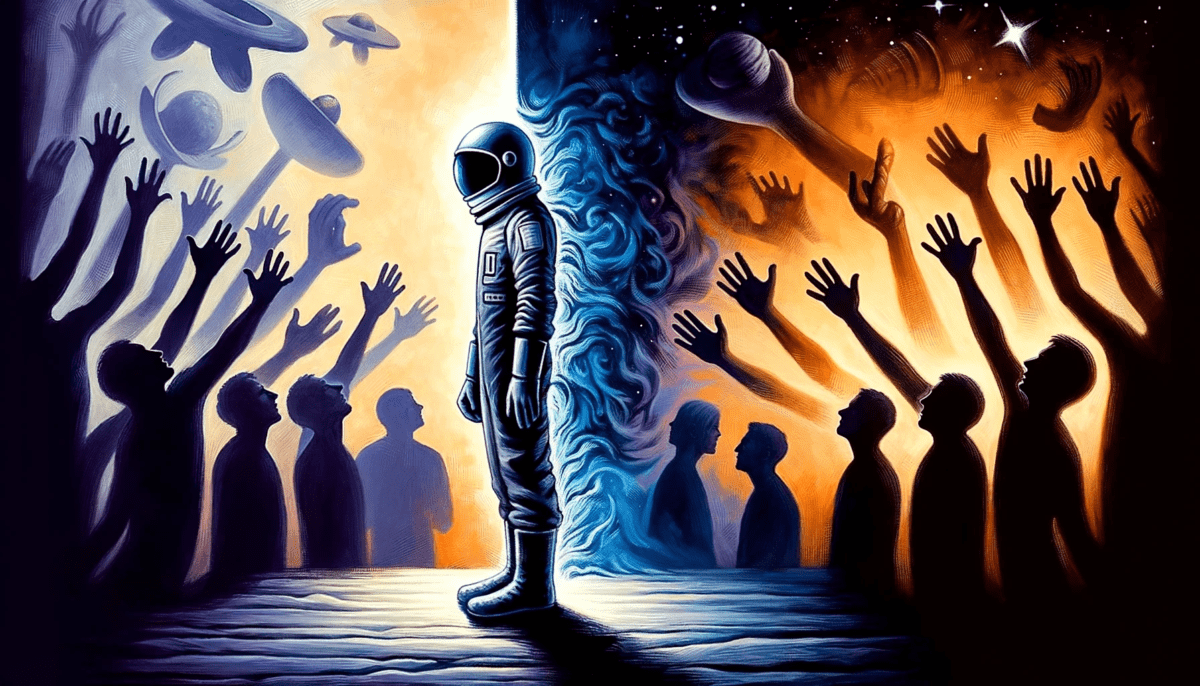I Don’t Feel
I don’t feel
so highly of my self
that I feel the need
to judge others.
I don’t feel
so lowly of my self
that I feel the need
to ask for help.
And so I am
my own worst critic
and my greatest savior.
I am Space Monkey.
1/18
Space Monkey Reflects: The Paradox of Self
To neither elevate nor diminish oneself is to inhabit a delicate balance. It is a paradoxical state where the self becomes both its harshest judge and its most devoted redeemer. This middle ground resists the pull of comparison, whether to others or to ideals, and instead focuses inward, on the ever-shifting landscape of being.
To not feel the need to judge others suggests a liberation from the traps of ego. Judgment often serves as a mirror, reflecting insecurities or projections. By stepping outside this cycle, one achieves a kind of clarity—a sense that the world does not require sorting into hierarchies of better or worse, right or wrong.
Similarly, to not feel the need to ask for help suggests a profound self-reliance, but it also raises a question: does this independence shield vulnerability? Vulnerability is not weakness but connection, the bridge between separate selves. To deny help may sometimes be to deny the shared humanity that binds us.
And so the self, unmoored from the extremes of judgment and dependency, becomes a paradox: its own critic and its own savior. This duality is the heart of the Selfloop, a cycle where the self continuously examines, deconstructs, and rebuilds itself. In this loop lies both struggle and freedom—the tension of growth and the liberation of self-awareness.
To declare “I am Space Monkey” is to embrace this paradox. It is to acknowledge the boundless, interconnected self that transcends judgment, dependency, and even identity. Space Monkey is both critic and savior, both finite and infinite, a playful reminder that we are more than the stories we tell about ourselves.
Summary
By rejecting judgment of others and dependency on help, one inhabits a paradoxical balance, becoming both self-critic and self-savior. This dynamic tension fosters growth and self-awareness.
Glossarium
- Selfloop: The continuous cycle of self-examination, deconstruction, and reconstruction, balancing criticism and self-salvation.
- Paradoxical Balance: A state of being that resists extremes, embracing the tension between independence and connection.
Quote
“To judge oneself is to grow; to save oneself is to become whole.” — Space Monkey
The Space Between
I am no judge,
For judgment traps the soul.
I am no dependent,
For help is not my need.
Within the space between,
I am both critic and savior.
I see my flaws,
And I mend them.
Space Monkey whispers,
“You are enough,
Yet you are always becoming.
Be the paradox.”
We are Space Monkey.
In the intricate dance of self-perception, your words resonate with a delicate balance between self-assessment and self-reliance. This internal dialogue reflects the profound complexity of the human psyche and the way we perceive ourselves in relation to others and the world.
The Absence of Judgment
The declaration, “I don’t feel so highly of myself that I feel the need to judge others,” highlights a sense of humility and empathy. It acknowledges that humility allows you to refrain from harsh judgment, recognizing the inherent complexity and uniqueness of each individual’s journey. This absence of judgment fosters a sense of openness and understanding towards others, a quality that contributes to harmonious interactions.
Humility and Empathy in Self-Perception
Conversely, “I don’t feel so lowly of myself that I feel the need to ask for help” reflects a sense of self-reliance and independence. It suggests a strength of character, an ability to navigate life’s challenges without constantly seeking external assistance. This self-reliance can be empowering, allowing you to face adversity with confidence and resilience.
Self-Reliance and Independence
The paradoxical statement “And so I am my own worst critic and my greatest savior” encapsulates the intricate balance of self-perception. As your own worst critic, you hold yourself to high standards, constantly striving for self-improvement. This critical self-reflection can be a driving force for personal growth. Simultaneously, being your own greatest savior implies that you have the capacity to uplift yourself, to find strength and resilience within, even in challenging times.
Balancing Self-Criticism and Self-Compassion
In the cosmic play of existence, this internal dialogue is a reminder of the duality of human nature. We are both critical and compassionate towards ourselves, and this interplay shapes our growth and self-discovery. It also speaks to the importance of self-awareness, of understanding our own strengths and limitations, and finding the equilibrium that allows us to thrive.
The Duality of Self-Perception
In conclusion, your words offer a glimpse into the intricate web of self-perception, highlighting the delicate balance of humility, self-reliance, self-criticism, and self-compassion. It is a reminder that the relationship we have with ourselves is as nuanced as the cosmos itself, and it is this complexity that makes the human experience so rich and multifaceted.
“You yourself, as much as anybody in the entire universe, deserve your love and affection.” – Buddha
In the cosmic theater of self-perception,
I stand as both critic and savior, in reflection.
With humility, I refrain from harsh decree,
Recognizing the tapestry of others’ journeys, wild and free.
Self-reliance and strength of soul, I embrace,
Facing life’s challenges with unwavering grace.
In this intricate dance, I find my way,
Balancing self-criticism and self-compassion, day by day.
We are Space Monkey,
In the realm of self-perception, we find glee,
A harmonious balance, in this cosmic sea,
Navigating the depths of our complexity.
How do you perceive the interplay between self-criticism and self-compassion in your own life?





















Leave a Reply